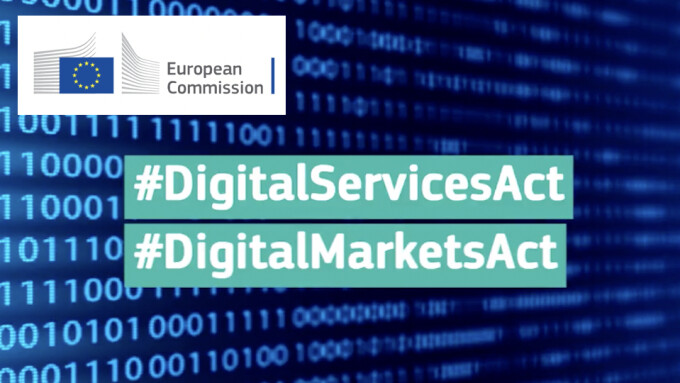BRUSSELS — The European Parliament reached a deal last week with EU member states on the controversial Digital Services Act — a European legislative package addressing “illegal and harmful” online content — by dropping mandatory phone registration for adult content creators on porn platforms.
Sex worker rights organizations and digital rights and privacy advocates welcomed the decision as a victory for their advocacy for meaningful consultation with adult content creators and other stakeholders.
The European Sex Workers Rights Alliance, formerly ICRSE, released a statement via Twitter, calling the decision “a step in the right direction.”
“We are glad that our voices were heard by the EU policymakers,” they stated. “ESWA takes the issue of image-based sexual violence and other forms of gender-based violence extremely seriously. Sex workers are often victims of this type of gender-based violence. Things have to change, and fast in order to protect victims and potential victims.”
“We will continue to work with all stakeholders to tackle the issue of image-based sexual violence while advocating for solutions that do not endanger sex workers' right to privacy,” they said. "We’re open for dialogue and believe that if we work together, we can find solutions to these issues.”
ESWA also thanked its members and supporters “who worked with us tirelessly” and invited activists to “keep fighting for sex workers' inclusion in the policymaking processes at national and the EU level. Sex workers are part of the solution.”
The Digital Services Act, however, retained provisions to “force tech giants like Google and Meta to police illegal content on their platforms more aggressively, or else risk potential multibillion-dollar fines,” CNBC reported Friday.
EU competition chief and the ideologue behind the DSA, Margrethe Vestager, posted a video on Twitter hailing the agreed-upon bill. “It’s not a slogan anymore that what is illegal offline should also be seen and dealt with online,” Vestager boasted. “Now it is a real thing. Democracy is back.”
European Commission President Ursula von der Leyen added that the DSA “will ensure that the online environment remains a safe space, safeguarding freedom of expression and opportunities for digital businesses.”
Wired Publishes Slanted Take
Today, Wired published a one-sided, tendentious report lambasting the DSA settlement for failing to force adult content uploaders to enter their private information.
The article, written by Wired’s Morgan Meaker, was headlined “Europe Has Traded Away Its Online Porn Law” and claimed that “the landmark Digital Services Act has a glaring omission — it ditches plans to tighten rules that could have protected survivors of revenge porn and other forms of sexual abuse.”
Meaker’s article cited anecdotal evidence from an alleged victim of revenge porn in Portugal who founded a nonprofit that advocates for those who want to remove intimate videos from online platforms, and which contracts for classes on the topic.
The Wired article extolled Article 24b, the same provision of the DSA draft that was criticized by sex workers and adult content makers, describing it as outlining “new rules that would have required people uploading content to porn platforms to verify their accounts with a phone number and email address.”
Article 24b, Wired noted, “would have also forced the companies behind the platforms to hire and train more moderators in image-based sexual abuse and have required them to take down content flagged by victims ‘without undue delay.’”
Meaker did note in passing that “the suggestion that people uploading content to porn platforms should have to verify their accounts using phone numbers and email addresses was controversial due to privacy concerns.” However, the article fails to quote any arguments against Article 24b by sex worker rights organizations in the EU. Instead, it leads with statements by Clare McGlynn, an “image-based abuse” attorney and professor from the U.K. — no longer an EU member country — who was hoping for a massive, explicit expansion in liability against online platforms.
Wired relayed McGlynn’s opinion that “as ever, online abuse against women and girls gets marginalized and minimized, and I think that’s what we've seen here. It’s not taken seriously.”
'Mainstream Porn Platforms' the Real 'Symbolic and Legal' Target
Shanley Clemot McLaren, co-founder of French group Stop Fisha told Wired that Article 24b “was particularly aimed at drawing attention to mainstream porn platforms, which is where much of this content ends up.”
“Passing this Article 24b within the DSA would have been necessary to not only symbolically and legally recognize the victims, but also underline the criminal offenses” McLaren added.
The only dissenting voice in an otherwise slanted piece was from Asha Allen, advocacy director for Europe at the Center for Democracy and Technology, who told Meaker that “concerns about privacy were justified, especially for people uploading content consensually to these platforms,” and added that Article 24b would have set a dangerous precedent “for all user-generated content platforms."
Allen also expressed concern that “once ID verification was endorsed at an EU level for porn platforms, it could be endorsed for social network sites like Facebook, TikTok or Twitter.”
For more on the DSA, click here.








